Christianity and libertarianism
In last month or two, an interesting discussion developed around libertarianism and Christianity and how much they are "compatible" with one another. When Christians consider libertarianism, it mostly comes down to usual left-right classification - people on the right can't think of stuff without it being controlled by the state, while people on the left add to libertarianism epithets like "they don't want to take care of the poor" because libertarians advocate free-market capitalism.

But, if we look at things more carefully we can see that Christianity and libertarianism, of all possible political ideologies, match perfectly. This statement is not "problematic" to Christian conservatives and Christians who consider themselves more progressive, but libertarian atheists/agnostics because, firstly, they don't see how Christian teachings lead to a more free society, and they think that Christians themselves want to take their freedoms - which is unfortunately true sometimes. Personally, I don't see any friction between libertarianism, freedom, and Christianity, why?
First of all, where does the New Testament (or any other place in the Bible) require the establishment of the welfare state, state that takes care of people from cradle to grave? Just because the State has noble goals (which are not met) like helping the poor and if Jesus calls us for helping the poor can lead many to think that the welfare states are "somewhere" in the Bible, but that's not the case. Many people like to mention the following few examples that supposedly support the welfare state or even some form of communism.
Early Church
"All the believers were one in heart and mind. No one claimed that any of their possessions was their own, but they shared everything they had. With great power the apostles continued to testify to the resurrection of the Lord Jesus. And God's grace was so powerfully at work in them all that there were no needy persons among them. For from time to time those who owned land or houses sold them, brought the money from the sales and put it at the apostles' feet, and it was distributed to anyone who had need." (Acts 4: 32-35)
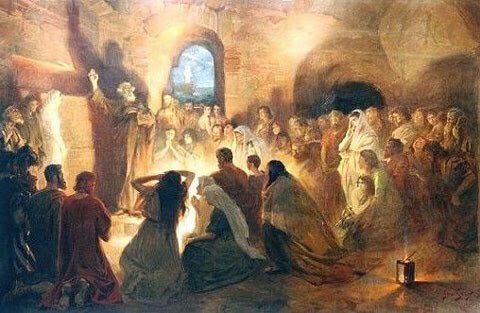
At first, this looks like communism, but details and context speak another story. Modern communism is based on Marxian class theory, in which workers rebel against capitalists - owners of means of production - and forcefully take private property. After some time, as Marx predicts, socialist state will "die off" because there would be no need for it and we would get a communist utopia in which everyone lives in peace, harmony, and freedom. Foremost, in that period in Jerusalem, in the early Church there is no "class struggle", nor is private property looked upon as something immoral. Christians of early Church share private properly spontaneously, and what's most important - willfully.
Secondly, there is no State on sight. There are no centurions that appear with soldiers, there is no state to forcefully take private property and collectivize industry, there is no element of force. Church in Jerusalem is just that - the Church, not the state. In no way did Church act as a modern communist state.
Further, that distinction that can be easily lost a little bit after in the Bible when Peter judges Ananias and Sapphira because they kept some of the money they got from selling their field. If we don't read carefully, we can get an impression that Peter judges them because they did not give all to the community.
"Then Peter said, “Ananias, how is it that Satan has so filled your heart that you have lied to the Holy Spirit and have kept for yourself some of the money you received for the land? Didn’t it belong to you before it was sold? And after it was sold, wasn’t the money at your disposal? What made you think of doing such a thing? You have not lied just to human beings but to God." (Acts 5:3-4)
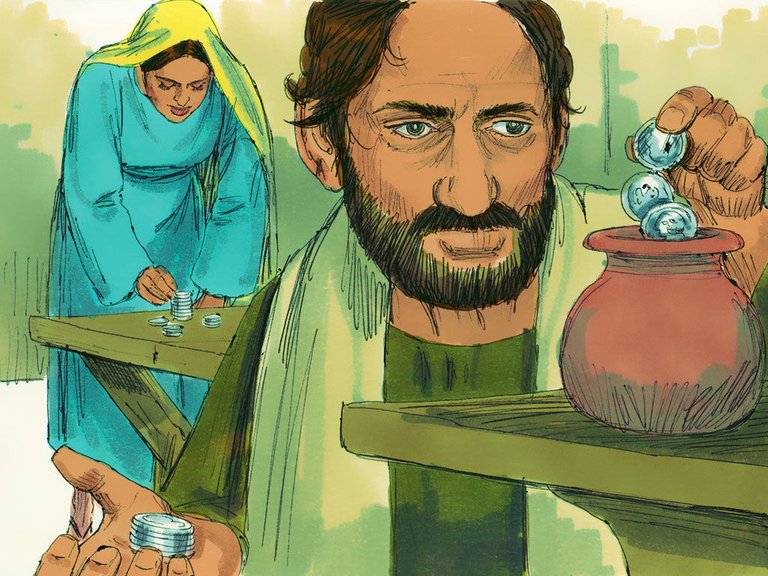
Let us consider the text more closely, what Peter does here is not judging because they kept the part of the money, but because they lied about it. In fact, he takes it for granted that property is theirs, even after it's sold. So we can't really talk about judging private property as such.
Thirdly, such a way of communal life of the early Church in Jerusalem never became a norm for all the Christians everywhere. In fact, that way of life did not even become a norm for Church in Jerusalem. What Acts describe is just an early stage in Church's life, when the Church was still small. Let's not forget, this where the beginnings of the Church in Jerusalem. Thousands of new Christians probably came from great distances to worship on Pentecost. If there were no such "extreme" measures, many of those who came would have to go back right after conversion, this way those Christians could stay and be taught. If we consider the alternatives, the communal property was probably the best solution.
In comparison with modern national states, Church in Jerusalem was a community surrounded by hostile culture. Circumstances where unique. As far as we know, this communal stage lasted for six months before the Church became big. It's not probably that all those new Christians stayed in Jerusalem for the rest of their lives. Many of them probably got back to their homes, carrying a new faith with them.
The Rich and the Kingdom of God
"As Jesus started on his way, a man ran up to him and fell on his knees before him. “Good teacher,” he asked, “what must I do to inherit eternal life?” “Why do you call me good?” Jesus answered. “No one is good—except God alone. You know the commandments: ‘You shall not murder, you shall not commit adultery, you shall not steal, you shall not give false testimony, you shall not defraud, honor your father and mother. “Teacher,” he declared, “all these I have kept since I was a boy.” Jesus looked at him and loved him. “One thing you lack,” he said. “Go, sell everything you have and give to the poor, and you will have treasure in heaven. Then come, follow me.” At this the man’s face fell. He went away sad, because he had great wealth. Jesus looked around and said to his disciples, “How hard it is for the rich to enter the kingdom of God!”" (Mark 10:17-23)
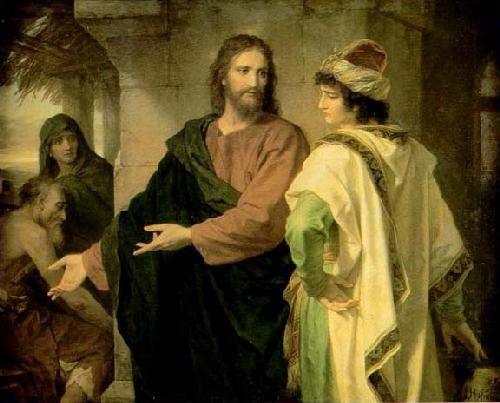
These verses are often mentioned when we get to the problem of "greed" and cited when people try to as a support of this kind of sentiment that condemns greed, but a more layered approach is necessary for these verses. "Alternative" view that is more succinct at the same time is one in which we can understand these verses as an argument against minimal standards in spiritual lives and a call for continual growth in our faith.
In this passage, a rich man approaches Jesus and asks him what he has to do to get eternal life. After rhetorical question if he understands with whom is he talking to, Lord asks him does he know the commandments. The obvious implication is that rich man has to comply with those if he wants eternal life. We can imagine that he was satisfied when he heard the answer because he kept those laws all of his life. Lord did not challenge his answer, but he accepted it as it is.
Because Jesus loved the man, he told him that he misses something. He told him that he has to sell everything that he has and give it to the poor; only then he will have a treasure in heaven, that is eternal life. As we discover in the end, the man could not do it. Selling everything that he has would not leave him with just with few things in his possession, but it would mean losing his status, luxuries and material security that came with his riches. After the man left, Jesus adds that the rich will have a hard time entering the Kingdom of Heaven:
"Jesus looked around and said to his disciples, “How hard it is for the rich to enter the kingdom of God!” The disciples were amazed at his words. But Jesus said again, “Children, how hard it is to enter the kingdom of God! It is easier for a camel to go through the eye of a needle than for someone who is rich to enter the kingdom of God.” The disciples were even more amazed, and said to each other, “Who then can be saved?” Jesus looked at them and said, “With man, this is impossible, but not with God; all things are possible with God.”
On the one side, interpretation is clear and straightforward: because of rich man's love for material possessions, he will not receive eternal life. Greed (or love towards material goods) stands between his dedication to Christ. Christ says that the rich man misses something, but he never says what is it. The obvious answer is that he does not have enough faith, which means that his wealth is a less of a problem than someone would suppose. The rich man missed faith that Jesus is a Son of God, Lord, and Savior. He saw an entrance to Heaven as a fulfillment of some minimal requirements, and Lord shows him that this understanding is incorrect. Lord addresses his idolatry; he loves material more than he loves the Lord and his eternal life is just another thing that he wishes to add to his possessions. Problem is a lack of faith. A wealthy person that is completely dedicated to Christ can have eternal life. Wealth is not by itself a proof for a lack of faith or presence of "greed".
Further, we need to remember that many of God's chosen people where rich, their wealth is, in fact, God's blessing and in different places and different times God blesses people with great wealth. One of the blessed people was Abraham, his servant speaks about him in Genesis 24:35:
"And the LORD has greatly blessed my master; he has become a wealthy man. The LORD has given him flocks of sheep and goats, herds of cattle, a fortune in silver and gold, and many male and female servants and camels and donkeys."
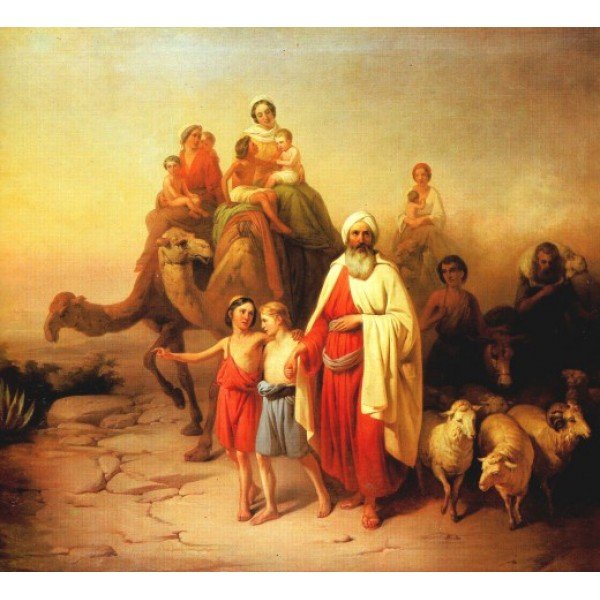
Christopher Wright, an Anglican priest and an expert for the Old Testament, says that there is no doubt that Abraham's riches are presented in the context of God's blessing. He concludes "that is, in fact, the first context in which wealth is mentioned in the whole Bible, and its strong connection with God's blessing is obvious."
This is correct without a doubt if God's mercy and intention are continued in spite of Abraham's repeated fear and weakness. Abraham saves his nephew Lot and he was willing to sacrifice his son Issac on God's command, but he was not the best role model at all times. Issac, following the line of blessings, also becomes wealthy. Genesis(26:12-13):
"Then Isaac sowed in that land, and received in the same year a hundredfold: and the Lord blessed him."
If we look at wealth as a blessing, parable with Jesus and a rich man has even more sense and we can conclude that the Old and New Testament do not contradict themselves. Jesus's disciples got scared when Jesus said that the rich man will enter the Kingdom of Heaven because rich are blessed and they will have a hard time to get there, how hard will it be for the poor?
If we disregard all these arguments, states in which private property is respected and protected are states in which the poor suffer the least, so we can see a simple pragmatist argument here for reducing poverty and suffering poverty causes.
Mormon example
The thins libertarians advocate, in areas of helping the poor is a complete abandonment all state programs that deal with that and their complete privatization. The best example of the success of private voluntary organizations is a system of the assistance of the Mormon Church that today has about 15 million members.
Very few Mormons are on welfare, Mormons have for their goal to be independent, self-sufficient and avoid welfare. Mormon Church leads a wide private system of welfare for its members that is based on the principle of training for independence as soon as possible.
Let's look one of the principles of the welfare of the Mormon Chruch:
"Church Welfare Plan . . . a system under which the curse of idleness would be done away with, the evils of a dole abolished, and independence, industry, thrift, and self-respect be once more established amongst our people. The aim of the Church is to help the people to help themselves. Work is to be enthroned as the ruling principle of the lives of our Church membership."
Mormon social workers in the program are instructed to act accordingly:
"Faithful to this principle, welfare workers will earnestly teach and urge Church members to be self-sustaining to the full extent of their powers. No true Latter-Day Saint will, while physically able, voluntarily shift from himself the burden of his own support. So long as he can, under the inspiration of the Almighty and with his own labors, he will supply himself with the necessities of life."
The immediate objectives of the welfare program are to: 1. Place in gainful employment those who are able to work. 2. Provide employment within the Welfare Program, in so far as possible, for those who cannot be placed in gainful employment. 3. Acquire the means with which to supply the needy, for whom the Church assumes responsibility, with the necessities of life.
There is probably no better for a private, voluntary, rational, individualist welfare program. State programs need to be abandoned, and rational thing is to expect that similar program will appear.
Part of the animosity of libertarians who are atheist/agnostic towards Christianity comes from the fact that they support politicians who collect political points on further taxing the rich and redistribution. As Mormon example shows us, it's far from necessary, often counterproductive. What we need is real libertarians and real Christians that will lead by example and create voluntary institutions.
Weed and bitcoin libertarians
Libertarians are often looked at as people who want to "liberate" society from all limitations and social norms. Caricature of a libertarian is a person whos mainly concern is the legalization of weed and bitcoin, a person who is completely indifferent to culture and all criticism from conservatives concerning culture or lack thereof in libertarians meets a fertile ground, while criticisms of political philosophy itself are not so convincing. Russel Kirk is probably one of the most "offensive" conservative critics. He stated that libertarian is,
"like Satan, can bear no authority, temporal or spiritual. He desires to be different, in morals as in politics"
and as a result there
"is no great gulf fixed between libertarianism and libertinism."
The thing that every libertarian would tell you is that, essentially, he wants an absence of any kind of compulsion. Some libertarians may not agree, but I think the principle of non-aggression is a core libertarian principle. The principle of non-aggression says that every aggression on an individual or his property is illegitimate where "aggression" is the use of force or threat of use of force. The State, although not the only one, is the most often initiator or force, that is the State has a monopoly on it.

Let's take minimum wage laws for example. Minimum wage law forces the employer to compensate a worker with some minimum amount of money, for which some politician that's it's "right", "minimum for a decent living" or something similar. Although it may "sound right" this kind of law violates the non-aggression principle and not just when we look from the employers perspective because the State forces him to manage his money in a certain way, but also from a worker's perspective because it prevents him from selling his labor and his time for less than that minimum amount. In practice, this kind of law hurts those who supposedly benefit from them, those are young people, people with little or no experience and those who cannot create enough value for someone to pay them that amount. Minimum wage law is maybe the best example of a good intention that "leads to hell", although sometimes I do ask myself are politicians who bring these laws understand that and still have no problems with that because they bring them political points. Unfortunately too often they can count on those points because masses are mostly economically illiterate.
Examples of breaking this principle are compulsory pension funds, public schools because of the way they are financed and lack of choice for parents, compulsory financing of all kinds of associations, agencies, infrastructure, already mentioned compulsory "solidarity", gun bans, "war against drugs" - not because libertarians look at drugs as something positive (or indiscriminately positive) but because the State prevents the individual to manage his body according to his own discretion and because it makes no sense, does not address the real issue but makes it even worse.
Once freed from compulsion, individuals would be free to live their lives as they please and do what they want to do, if they don't harm others, of course. I think this is where we come to a "problem" that many of libertarian critics don't understand and that is that if you advocate for less violence from the State that does not mean that you advocate a life without any kind of moral code. Libertarian can agree with the sanctity of life, the importance of family unit and importance of community. Libertarianism is not a permission for everything, "atomistic individualism", "moral relativism", "utopia" or a naive statement that all people are good and that we don't need limits.
It's true that too many libertarians are, with their views on culture or more precisely lack of them in some way repulsive to most people. Libertarian "catechism" says nothing about culture, for libertarians freedom is the highest political goal. But there is no political philosophy that exists in a vacuum, and for most people, political identity is just an abstraction of their wider views on culture and those two are separated only in theory, while in practice they are inseparably connected.
Western culture is worthy of preservation and defense. Objective moral standard, especially those found in Judeo-Christian tradition are fundamental to free and civilized society. In this value-system, there is nothing non-libertarian, nor there are "non-libertarian" elements in institutions of family, Church, local community etc., in fact, those kinds of institutions help with protecting individuals against the State and they are necessary for social development and insistence on virtues.
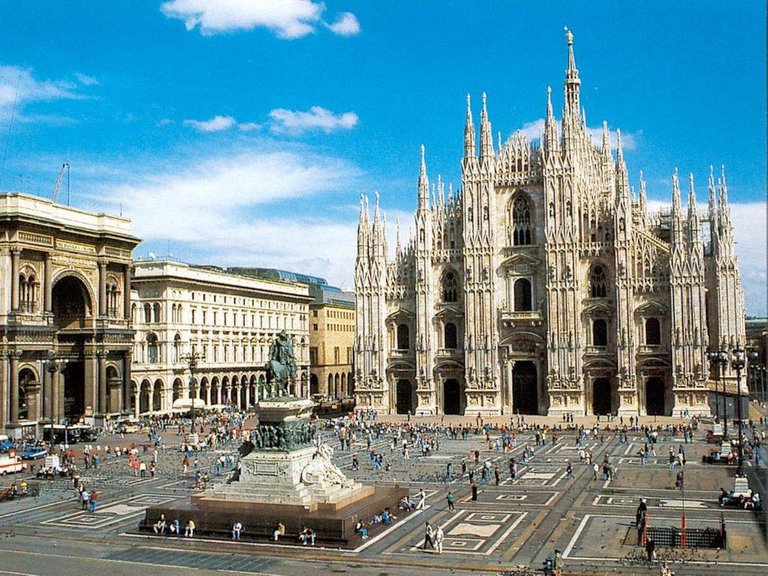
Only free we can imitate Christ
Christianity must accept free will to make sense. Everyone has a choice between accepting or refusing God. If it would not be that way, we could not make that choice and God would be a tyrant. If moral decisions would be made instead of us on an institutional level by bureaucracy, people lose their freedom and there is no purpose to life, and God loses his "place".
To some, it would probably be easier for God to be a "good tyrant" that does not let us separate from him, but he is not a "good tyrant" but a good Fater, he gives us all freedom to choose him. He does not want to live our lives and make our decisions. If God is almighty and he did not create us without free will, why would he let others violate our free will, someone among us that is also prone to sin and abuse of power?

God always communicates with people, and he did that form the beginning. He communicates with us through creation (Psalm 19:1), ancient prophets (Hosea 12:10, Hebrews 1:1), through the Holy Spirit (John 16:13, Acts 16:6), through Scripture (Hebrews 1:1), and thought his son, Jesus Christ (John 14:9).
Jesus Christ is an embodiment of God's Word and he asks us to follow him. That means to give up power that we have over other people. If we want to change the world like he did we need to imitate Him. Jesus never asked worldly powers to "model" peoples behavior, he is himself, and he still is a model for every person to follow willfully. If Jesus wanted to make good Christians from people using worldly powers, why was he not interested in gaining worldly power, why did he did miracles, why did he preach and could he not avoid a situation where he was tortured and killed on a cross?
Not only that he did not seek to gain worldly power, but he refused it:
"Again, the devil took him to a very high mountain and showed him all the kingdoms of the world and their splendor. “All this I will give you,” he said, “if you will bow down and worship me." Jesus said to him, “Away from me, Satan! For it is written: ‘Worship the Lord your God, and serve him only.’ Then the devil left him, and angels came and attended him."
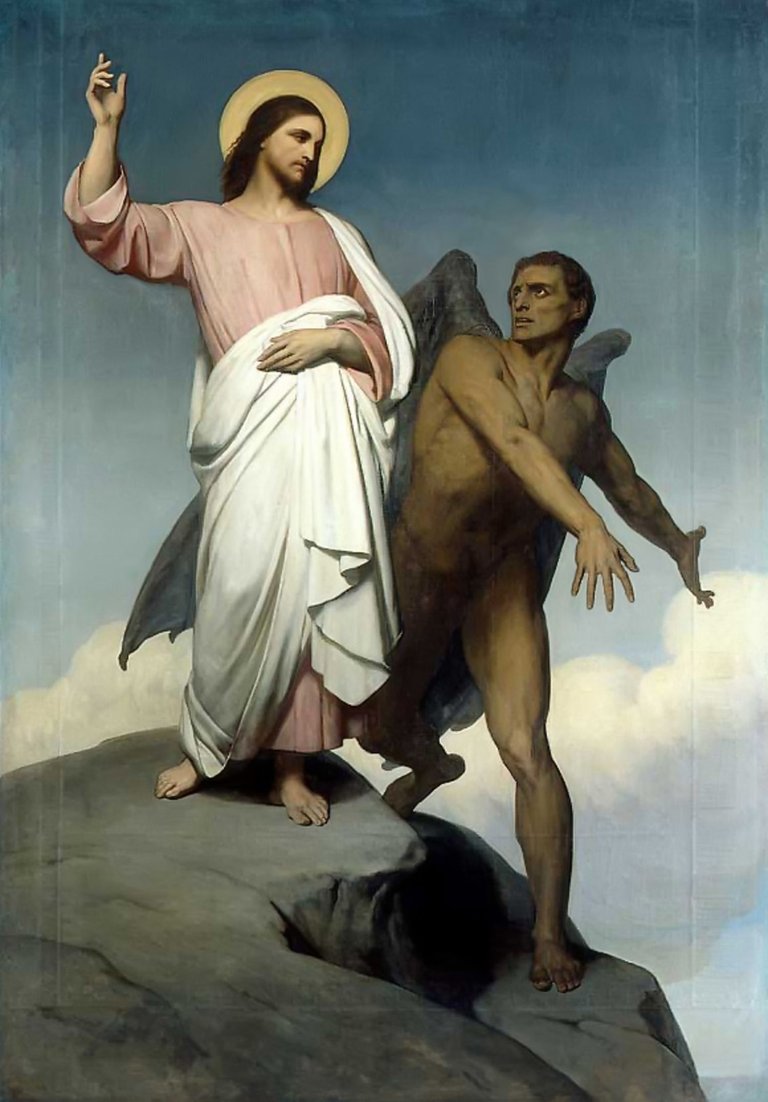
People do stupid things, they take drugs, they gamble, they prostitute, they get drunk, but those who want to change the world have to resort to assurance, and that is the only acceptable way. Sadly, many religious people look to the state when there is a need to model the behavior of their fellow citizens. That is not contrary to libertarian principles, but, as I hopefully showed - Christian principles.
Character or Rome vs character or Jesus
All Christian views and theology, starting with the New Testament are in opposition to all major principles of Rome. Romans love power, Christians live in submission, Romans worship mighty Gods, Christian God was tortured and died on the cross.
A crucifixion is a Roman form of punishment that was intended for non-Romans for three types of crime: attempted escape from slavery, banditry or piracy and rebellion against Roman Empire. Jesus was not an escaped slave, nor was he a bandit or a pirate. That means that Pilate saw Jesus as a rebel against the Empire. His conviction and murder cannot be considered as just an isolated case, his suffering and death is not just a symbol of some "local" injustice of the Roman Empire against an innocent man. The fact that Jesus who is a living Word of God was killed on a cross is also a mirror of whole Roman Empire, everything that is rotten in a way it was run.
Let's remember that Jesus could have been let free, Roman governor had the practice to free one Jewish prisoner just before Passover as an act of goodwill. The masses chose Barabbas instead of Jesus, event after Pilate did not found a single accusation against him to be true, neither did Herod.
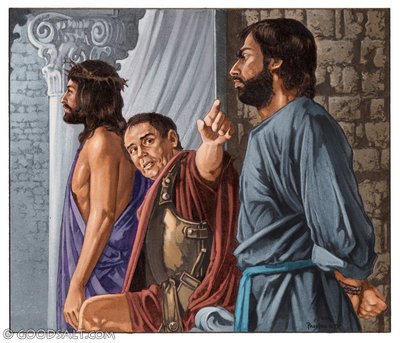
"Wanting to release Jesus, Pilate appealed to them again. But they cried, saying, Crucify him, crucify him. For the third time he spoke to them: “Why? What crime has this man committed? I have found in him no grounds for the death penalty. Therefore I will have him punished and then release him. But with loud shouts they insistently demanded that he be crucified, and their shouts prevailed. So Pilate decided to grant their demand. He released the man who had been thrown into prison for insurrection and murder, the one they asked for, and surrendered Jesus to their will."
I am not a theologian, nor I am some kind of expert for the Bible, but I have my own opinion on this. Jesus was not only unjustly accused, but the "law" by he was accused was unjust. Why? Because to have a crime, you have to have a victim. Not a potential or alleged victim, but a real victim. Who lost his possessions, his health, his life, his liberty because Jesus "rebelled"? Without researching, I would conclude there is no such person.
If we look at the human history, best examples of immoral acts that humanity is capable of have been done by States. In spite of that, religious people look at the States to use force against peaceful people and make them act in a certain way, they defend, support and search for excuses for the State, politicians, unjust laws and wars. States killed a quarter of a billion people, not including abortions, billions of people are slaves because the State appropriates their property, and all this "in the name of the people". The crucifixion of Jesus is also an example of that, it represents our capacity to separate ourselves from the Word of God, insomuch to crucify, and justify it with it being "democratic" or "will of the people". The power of the State enables us to "mask" our shortcomings, to "wash hands" and evade responsibility for our own actions and omissions. In reality, there is nothing that was not paid for, there not a single sin or a collective delusion that will not bite us by the tail.
Romans 13
Probably the biggest "challenge" for someone who advocates libertarianism to Christians in Romans 13. How to "justify" very small or no state while taking into consideration that chapter? We don't need to, the chapter itself, even if it does not seem like it at first - does not advocate big government or blind obedience to government. Firstly, when that would be the case it would be contrary to other places in the Bible, which is not the case, but that chapter is very "useful" if your goal is to justify government and its decrees. Of course, that Romans 7 to 13 that is, in fact, the most "problematic" have to be looked in the context of the whole Holy Scripture. Let's consider the indirect context of the chapter, Romas 12:14 says:
"Bless those who persecute you; bless and do not curse."
The basic message of Paul here is the same message that Jesus speaks of on the mountain: "But I tell you, love your enemies and pray for those who persecute you!" and that way of thinking goes through 15 verses, all the way to Romans 13:7. That chapter was written for those who were persecuted, for those who were an object of imperial wrath, not to the persecutors, that is a recipe for persecuted, not giving power to "governments". Just because we are asked to turn the other cheek does not mean that those who hit us are right.
Further, Scripture has a lot to say about the State, to focus only on Romans is - unbiblical, at least. We need to consult with other "thirteens" like Isaiah 13 and Revelation 13, Kings, and what some of the old-testament prophets say.
Discussion about Romans 13 has to be approached with a great dose of skepticism towards the State. On some basic level, everyone knows that theft and murder are wrong. Bible also tells us that is wrong to seek revenge. The "State" is a human invention, not God's, to evade those basic commandments. The State lets people do what they can't as private individuals.
What Romans 13 says about governments can be hardly called flattering. What does Paul think when he says "government"? Let's look at Ephesians 6:12:
"For our struggle is not against flesh and blood, but against the rulers, against the authorities, against the powers of this dark world and against the spiritual forces of evil in the heavenly realms."
Phrases that are used here - authorities and powers are often understood as "peacekeepers, wise, well-meaning, public servants, people that serve the community". But in the Bible, these words are used when we speak about evil, spiteful people.
The State is looked upon as a product of rebellion against God. What Romans 13 says is that we don't resist evil. The ways in which we overcome evil are good deeds, peace, and service.
What does libertarianism "offer" to Christians? Why would a Christian be a libertarian?
Libertarianism does not "offer" anything to Christians. In fact, libertarianism does not "offer" anything to anyone except freedom. Libertarianism means that the State has its hands tied in relation many questions, and that is by itself a good, very good thing. "Libertarian" framework gives Christians the necessary liberty to develop their own institutions and leave the "vicious circle" of fighting for power. Even winning does not mean that the things will be as we want them to be, or that they will change in a direction in which we want them to change. To be honest, nothing can guarantee us that, but I would argue that opening your own private schools, for example, is more purposeful than asking the government to stop teaching your kids stuff that you do not agree with.

It's reasonable to believe that libertarian society would be less "libertine" or "socially permissive" and more conservative because of one simple reason - as the State is decreased in its power and importance, institutions that are neglected will become more important. In libertarian society is very hard to impose your values and price of them to other people. If you rely on family, Church, and charities it is reasonable to expect that they will impose some conditions.
"Christianity must accept free will to make sense" I love this sentence
Great post! just need some photo source linked and will be perfect :)
Very elaborated post with a lot of information and I'd say christianity shouldn't be urging people to do good deeds, but people should feel the love of Christ inside themselves and do their best to help each other and make good deeds because they want to.
Very interesting post,what was your source?
A bit of Tom Woods, Lew Rockwell, there is a whole website dedicated to Romans 13, some other christian libertarian webpages...
Maybe in the first stages this was possible outlook, but later it evolved into a more political concept, not so religious.
Thanks for your good posts, I followed you!
Peace, Abundance, and Liberty Network (PALnet) Discord Channel. It's a completely public and open space to all members of the Steemit community who voluntarily choose to be there.Congratulations! This post has been upvoted from the communal account, @minnowsupport, by nullpointer from the Minnow Support Project. It's a witness project run by aggroed, ausbitbank, teamsteem, theprophet0, someguy123, neoxian, followbtcnews, and netuoso. The goal is to help Steemit grow by supporting Minnows. Please find us at the
If you would like to delegate to the Minnow Support Project you can do so by clicking on the following links: 50SP, 100SP, 250SP, 500SP, 1000SP, 5000SP.
Be sure to leave at least 50SP undelegated on your account.